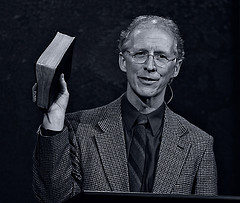 John Piper:
John Piper:
“When he describes the sins of his own people in Romans 2:24, the climax of the indictment is this: “The name of God is blasphemed among the Gentiles because of you.”
What makes sin sin is not first that it hurts people, but that it blasphemes God. This is the ultimate evil and the ultimate outrage in the universe.
The glory of God is not honored.
The holiness of God is not reverenced.
The greatness of God is not admired.
The power of God is not praised.
The truth of God is not sought.
The wisdom of God is not esteemed.
The beauty of God is not treasured.
The goodness of God is not savored.
The faithfulness of God is not trusted.
The promises of God are not relied upon.
The commandments of God are not obeyed.
The justice of God is not respected.
The wrath of God is not feared.
The grace of God is not cherished.
The presence of God is not prized.
The person of God is not loved.
The infinite, all-glorious Creator of the universe, by whom and for whom all things exist (Rom. 11:36) – who holds every person’s life in being at every moment (Acts 17:25) – is disregarded, disbelieved, disobeyed, and dishonored by everybody in the world. That is the ultimate outrage of the universe.
Why is it that people can become emotionally and morally indignant over poverty and exploitation and prejudice and the injustice of man against man and yet feel little or no remorse or indignation that God is so belittled? It’s because of sin. That is what sin is. Sin is esteeming and valuing and honoring and enjoying man and his creations above God. So even our man-centered anger at the hurt of sin is part of sin. God is marginal in human life. That is our sin, our condition.
And the consequence of this condition is the wrath of God. Romans 1:18, “The wrath of God is revealed from heaven against all ungodliness and unrighteousness of men who suppress the truth in unrighteousness . . . . (21) For even though they knew God, they did not honor Him as God or give thanks.” The failure to make the goodness and glory of God the center of our lives brings the wrath of God upon us.
Romans 2:5, “Because of your stubbornness and unrepentant heart you are storing up wrath for yourself in the day of wrath and revelation of the righteous judgment of God.” In Romans 2:8, “[Those who] do not obey the truth, but obey unrighteousness, [will receive] wrath and fury.” When we hear words like this – that we are all “under sin” and that sinners will receive the “wrath and fury” of God – we need be still and let that sink in. These are terrible words. When the omnipotent God has wrath and fury, no greater negative force can be conceived. We speak of the fury of a hurricane that flattens buildings or the fury of a tornado that snaps off trees like toothpicks. But these forces are as nothing compared to the fury of the wrath of God.
In Revelation 14:10-11 John gropes for language to describe the length and depth of hell. He says that sinners “will drink of the wine of the wrath of God, which is mixed in full strength in the cup of His anger; and he will be tormented with fire and brimstone in the presence of the holy angels and in the presence of the Lamb. And the smoke of their torment goes up forever and ever; they have no rest day and night.” There is nothing more fearful in reality or in imagination than the prospect of everlasting, never-ending, omnipotent, unimpeachably just and righteous divine wrath and fury. And that is the consequence of our sin.
Unless we get this clear in our heads and powerful in our emotions, the love of God will be reduced to sentimentalism or to a mere assistance for our self-help improvement and recovery plans. It will not be to us the infinitely precious, tremblingly embraced treasure that it really is.”

 “Out of the anguish of his soul he shall see and be satisfied; by his knowledge shall the righteous one, my servant, make many to be accounted righteous, and he shall bear their iniquities.” – Isaiah 53:11
“Out of the anguish of his soul he shall see and be satisfied; by his knowledge shall the righteous one, my servant, make many to be accounted righteous, and he shall bear their iniquities.” – Isaiah 53:11